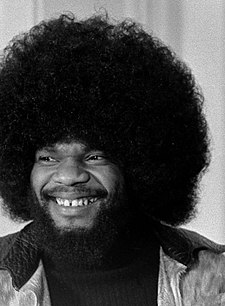In New York City, hair is a human right.
 The city’s Commission on Human Rights announced a new ban on hair discrimination this week that will impose $250,000 fines on employers or other businesses that question black hairstyles.
The city’s Commission on Human Rights announced a new ban on hair discrimination this week that will impose $250,000 fines on employers or other businesses that question black hairstyles.
The commission’s new “guidelines” ban any discrimination against people with “natural hair, treated or untreated hairstyles such as locs, cornrows, twists, braids, Bantu knots, fades Afros, and/or the right to keep hair in an uncut or untrimmed state,” according to the document.
The New York Times reports:
The guidelines … are believe to be the first of their kind in the country. They are based on the argument that hair is inherent to one’s race (and can be closely associated with ‘racial, ethnic, or cultural identities’) and is therefore protected under the city’s human rights laws, which outlaw discrimination on the basis of race, gender, national origin religion and other protected classes.
The guidelines make it clear they’re aimed at preventing discrimination against black folks.
“Anti-Black bias … includes discrimination based on characteristics and cultural practices associated with being Black, including prohibitions on natural hair or hairstyles most closely associated with Black people,” according to the document. “Bans or restrictions on natural hair or hairstyles associated with Black people are often rooted in white standards of appearance and perpetuate racist stereotypes that Black hairstyles are unprofessional. Such policies exacerbate anti-Black bias in employment, at school,while playing sports, and in other areas of daily living.”
Some city residents are welcoming the move.
“It’s about time the city is recognizing they shouldn’t discriminate based on the texture, the style of what you like,” Morrisania resident Shaina Walters told CBS New York. “Your hair is your hair.”
City officials are promoting the hair discrimination ban with the hashtag #YourHairYourRightNYC.
Human Rights Commissioner Carmelyn Malalis posted a notice to Twitter with the hashtag and a picture of a young black boy feeling President Obama’s hair during his time in the Oval Office.
One of my favorite photos of @BarackObama #PresidentsDay
Hair is a part of you. Race discrimination based on hair is illegal in NYC. #YourHairYourRightNYC@NYCCHR released new legal enforcement guidance addressing discrimination based on hair — https://t.co/NX1V9356g5 pic.twitter.com/LOBUcqVK5L
— Carmelyn P. Malalis (@CarmelynMalalis) February 18, 2019
“One of my favorite photos of @BarackObama #PresidentsDay,” Malais wrote. “Hair is a part of you. Race discrimination based on hair is illegal in NYC.”
“Imposing Eurocentric values of what is professional or neat or beautiful or proper, that has no place in New York City,” Malais told CBS New York.
Demoya Gordon, a supervising attorney with the Commission on Civil Rights, said she’s currently investigating seven cases of hair discrimination in the city, a problem she contends “is harmful, not just emotionally or psychologically, but physically and financially.”
In addition to workplaces, the city’s hair discrimination ban will also extend to nightclubs, gyms, schools and other places, according to BPR.
“As a best practice, the Commission encourages employers and other covered entities to evaluate any existing grooming or appearance policies, standards, or norms relating to professionalism to ensure they are inclusive of the racial, ethnic, and cultural identities and practices associated with Black and historically marginalized communities,” according to the Human Rights Commission’s “hair guidance.”
“The Commission further recommends that public and private schools assess any workplace preparation programs geared toward helping students find employment to ensure that they do not intentionally or inadvertently sent the message that natural hair or hairstyles associated with black communities are ‘unprofessional,’ ‘messy,’ or ‘unkept.’”
It’s unclear how the city plans to spend money collected from fines imposed by the new law.

Leave a Comment
COMMENTS POLICY: We have no tolerance for messages of violence, racism, vulgarity, obscenity or other such discourteous behavior. Thank you for contributing to a respectful and useful online dialogue.